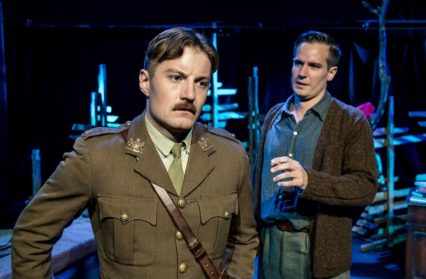Stephen Macdonald’s 1982 play Not About Heroes is what it says; it’s not even about heroism, if the courage needed a century ago to to admit the love that dared not speak its name is the kind of bravery being addressed. The play, a spare two-hander, deals with the relationship between the Great War poets Wilfred Owen and Siegfried Sassoon when they were soldiers being treated for shell-shock at Craiglockhart, the Scottish hospital specialising in the treatment of a condition whose name was spoken in only the vaguest of terms short of denoting cowardice. Today, in a semantic triumph as much as a clinical re-focusing, shell-shock has become Post-Traumatic Stress Disorder.
On paper, literally, Not About Heroes appears to be a difficult text to enact. Two strands of the relationship are intertwined: the unstinting influence of Sassoon the celebrated poet on Owen, the as yet unknown one; and a friendship rapidly deepening into love. A third intervenes in the shape of soldierly duty and valour. Both men were entre batailles and decorated, the ferociously anti-war, Sassoon returning to the Front to be wounded by ‘friendly fire’, Owen to be killed by a German sniper a week before the Armistice. Other characters are mentioned – Max Beerbohm, Robbie Ross, Robert Graves – to create the Home Front milieu in which the literary reputations of both were swimming, Owen barely in the shallows but with a rate of improvement due almost entirely to Sassoon’s advocacy – and, indeed, his practical mentoring. According to this version, words and phrases in Owen’s first drafts owe their refinements to Sassoon.
One of the play’s many subtleties unequivocally brought out by the production is the almost rustic innocence of Iestyn Arwel’s Owen, the son of a Shropshire railwayman and his wife (though the son was greedy for education and knowledge). It supported a talent scarcely acknowledged by Owen himself. Daniel Llewelyn Williams’s Sassoon exudes a patrician superiority equally unsuspected by its owner and rarely condescending but hinting at class difference. It keeps the bond grounded and straining against Owen’s unthinking willingness to cut its stays. Passionate letters from Owen, post-mortem, to Sassoon bring the recipient to his sharpened senses and, in reality, were suppressed by Owen’s brother, who was perhaps fearful of consequences more serious than indelicacy or discredit.
Llewelyn Williams and Arwel have to bring both characters and issues to life almost immediately. There’s barely room for evolution. Doing that for the two poets as individuals for whom valour in the killing-fields seemed almost peripheral if not incidental (Sassoon famously tossed his medals in the river) is high actorly achievement. One wonders if the manifestations of combat shock were not partly related to the anguish of suppressed intimacy. Moreover, Tim Baker’s production resists the play’s temptation to make its subject the writing and polishing of verse, which it could easily have become. He and the two actors instead blend all the themes, leaving the protagonists to remain united in art but eternally divided in outspoken passion. By Macdonald’s account, Owen was the less inhibited in tenderness but the more carelessly imposing as a poet.
This is the second production by the Newport-based Flying Bridge, inaugurated by Baker and Llewelyn Williams, whose aim is to stage ‘theatre of the highest quality that is truthful, provocative and inspiring’. Even if these virtues resided only in the choice of play they’d be laudable; but there’s every indication that they are also marked by the commitment of the whole company. Choosing Not About Heroes in the centenary year of the Battle of the Somme and as the hundred-year anniversary of the end of the war in 2018 approaches further emphasises an aim to present theatre with contemporary poise and relevance. If two actors and a director do not an ensemble make, the addition of Oliver Harman (designer), Kevin Heyes (lighting), and Dyfan Jones (sound) completes the picture. Each contributes an essential but essentially self-effacing strand to the creation of a taut production.
Not About Heroes is on tour until November 11. The website www.notaboutheroes.info has details.
Nigel Jarrett is a freelance writer, a winner of the Rhys Davies Prize for short fiction, and a regular Wales Arts Review contributor. His latest collection of stories, Who Killed Emil Kreisler?, and his novel, Slowly Burning, were published last year.



 Enjoyed this article? Support our writers directly by buying them a coffee and clicking this link.
Enjoyed this article? Support our writers directly by buying them a coffee and clicking this link.








